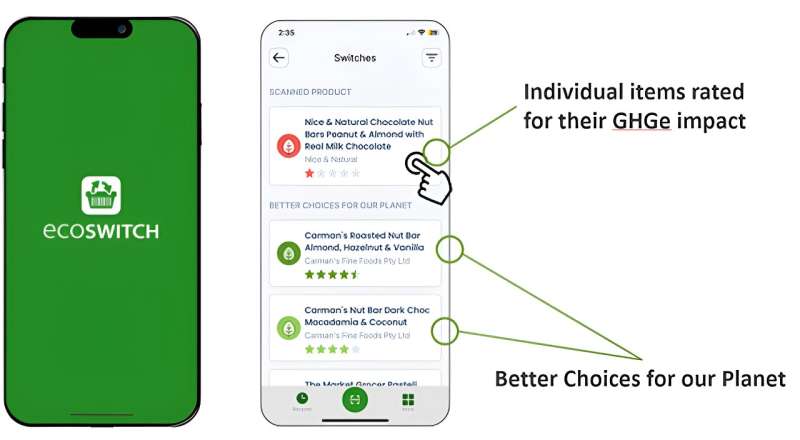This article has been reviewed according to Science X's editorial process and policies. Editors have highlighted the following attributes while ensuring the content's credibility:
fact-checked
trusted source
written by researcher(s)
proofread
We gave 60,000 food products a 'planetary health' star rating—see how your favorites stack up

Lasagne or risotto? Muesli bar or brownie? What's better for the planet? How do you know for sure?
We've crunched the numbers on greenhouse gas emissions so you don't have to. All you need is a smartphone with our free ecoSwitch app.
Simply scan the product's barcode to check the "planetary health rating." Then see if it's worth switching to another product with a better rating.
If every Australian swapped higher-emission products for very similar but lower-emission products, total emissions from household groceries would fall by a quarter (26%). Taking this a step further, consistently switching to the "less similar" lower-emission option—such as swapping to a different type of bread—would cut emissions from household groceries by a whopping 71%.
Devising 'planetary health ratings' for food
Australians are becoming increasingly aware that their food choices have consequences.
Many would like to see sustainability information on product packaging, to help them make more environmentally-friendly choices.
But in the absence of industry-wide standards and regulations, unofficial logos and vague claims are proliferating. The Australian Competition and Consumer Commission (ACCC) has found misleading "greenwashing" labels are particularly prevalent in the food and beverage sector.
Frustrated by a lack of action, we devised our own labeling system.
First, we carried out a total life-cycle assessment of greenhouse gas emissions for more than 60,000 packaged food products.
We used the list of ingredients as a starting point. Then we estimated the weight of each ingredient, using a mathematical formula.
We sourced existing information on total greenhouse gas emissions associated with the production of each ingredient. And finally, we put it all together.
Each product now has a "planetary health rating", which is a measure of its emissions on a ten-point scale from half a star (high emissions) to five stars (low emissions). This is consistent with the Health Star Rating format.
Through the ecoSwitch app, consumers can see how selected packaged food items rate and then consider more environmentally friendly alternatives. The free, user-friendly app is now available from the App Store and Google Play.
Sobering revelations
Our new analysis of the ecoSwitch database, combined with sales data, delivers a sobering picture of the Australian diet.
The food and drink we bring into our homes each year represents total emissions of about 31.3 million tons of greenhouse gases.
The main offenders are meat and meat products (49% of emissions), dairy products (17%) and non-alcoholic drinks (16%).
Cutting consumption of these products can help rein in the food system's contribution to global warming.
But packaged foods contain many ingredients, with differing levels of emissions. This is where ecoSwitch can help. Take soup, for example.
One type of pumpkin soup available in Australia receives a planetary health rating of 5 stars, while a chicken and sweetcorn soup receives 1.5 stars. In the snack bar category, a particular fruit and oat muesli bar receives 4 stars while a chocolate and oat bar receives 1 star.
Such large variation within product categories shows how much difference consumers can make through their choices.
The ecoSwitch app also provides the health star rating for each food product in the database. This is very useful considering the health star ratings are only displayed on one-third of products, because it is a voluntary system.
Fortunately, in most instances, the more sustainable choice is also the healthier choice, so consumers don't need to trade off personal health for planetary health.
Driving change across the food supply chain
The food and beverage sector ranks second only to the energy sector in terms of global contributions to greenhouse emissions. Patterns of consumption in higher-income countries such as Australia must change if we are to meet our climate goals.
Incorporating sustainability considerations into the Australian Dietary Guidelines is worthwhile, but this alone is insufficient. Voluntary, or better still, mandatory food labeling is needed to reduce the production of high-emission products (such as meat and dairy) in favor of low-emission products (such as vegetables).
We believe the ecoSwitch app has the potential to trigger positive change along the entire food supply chain. Once consumers have access to more comprehensive information about products, manufacturers will change their production processes to achieve more favorable scores. This was the case with nutrition labeling, and there is every reason to expect a similar response to sustainability labeling.
Governments can also use the information to monitor the food sector, identify particularly problematic products and product categories, and offer incentives—or penalize companies accordingly.
Knowledge is power, and ecoSwitch gives consumers the knowledge they need to make more sustainable food choices. In the absence of other reliable information, such knowledge is vital to help shoppers identify sustainable packaged food options in the supermarket.
Answers to questions like those posed at the start of this article will depend to a certain extent on the specific products being considered. But typically, risotto is better than lasagna. One pumpkin, leek and spinach risotto, for example, had a planetary health star rating of 4.5, compared to a beef lasagna with 0.5 stars. And cereal (muesli) bars are usually better than brownies. One apricot and almond muesli bar had a planetary health star rating of 4.5, while a fudge chocolate brownie bar received 0.5 stars.
Provided by The Conversation
This article is republished from The Conversation under a Creative Commons license. Read the original article.![]()




















